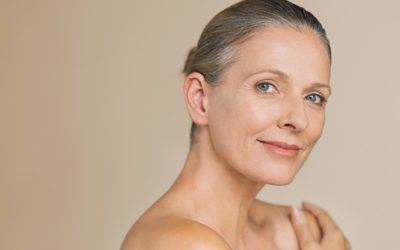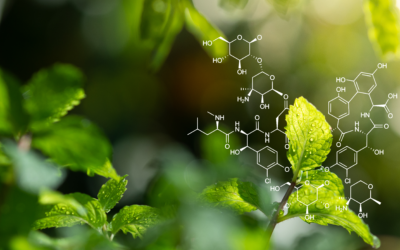Nutrition is the natural way to treat a skin condition.
Would you like to improve the symptoms of skin condition? Many people trail over-the-counter medications and self-help remedies in the hope that they will help bring some relief, but often end up feeling disappointed and frustrated because of poor results. Symptoms like Itchy, flaky, and sore skin can impact your life in so many ways including how well you sleep, how active you are socially and your day-to-day self-confidence. We know how much it would mean to you to change that. At JWSN we provide the provide clear, evidence-based solutions to help improve the symptoms of psoriasis, acne, rosacea, and eczema. Living with a skin condition can be tough but we want to help you change that so that you can start feeling amazing.
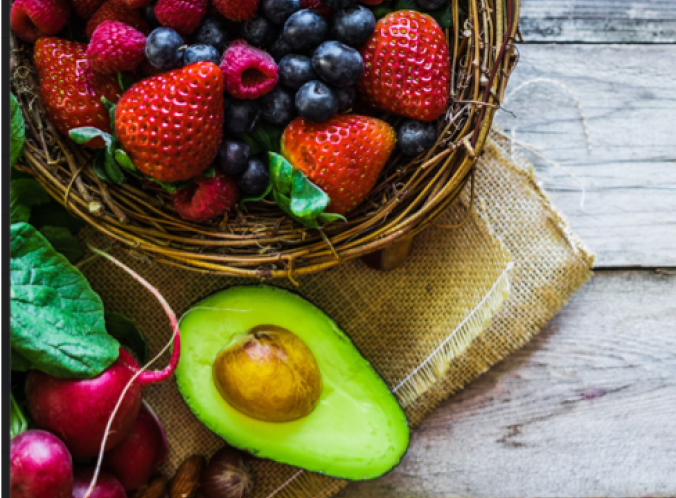
Nutrition and Skin Conditions
There is good scientific evidence to support the benefits of specialist nutrition and lifestyle interventions on the severity of symptoms associated with a skin condition. For example, Itchy and sore skin or deep painful spots are often caused by inflammation deep within the layers of the skin, and our interventions can help alter that. Our specialist advice can stabilising your immune system resulting in less inflammatory cells in your body. In turn, this reduction in skin inflammation will help soothe skin irritation and resolve your symptoms so you can refocus on the more rewarding aspects of your life! Our nutritional approach helps to protect your skin both inside out!
Nutritional Support for Your Skin Condition:
Psoriasis
Psoriasis was first documented over 2,000 years ago, although many people that suffered from psoriasis at this time were unfortunately misdiagnosed with leprosy.
Psoriasis is an immune-mediated, inflammatory disease that affects adults rather than children. Psoriasis is often not formally diagnosed or treated; many people try to self-treat or just ‘live’ with their condition. People with psoriasis suffer from itching, pain, and cracked skin, which often interrupts their sleep. In addition to physical symptoms, self-consciousness can lead to social avoidance and impact career development. Unsurprisingly, about 30% of people that suffer from psoriasis feel depressed.
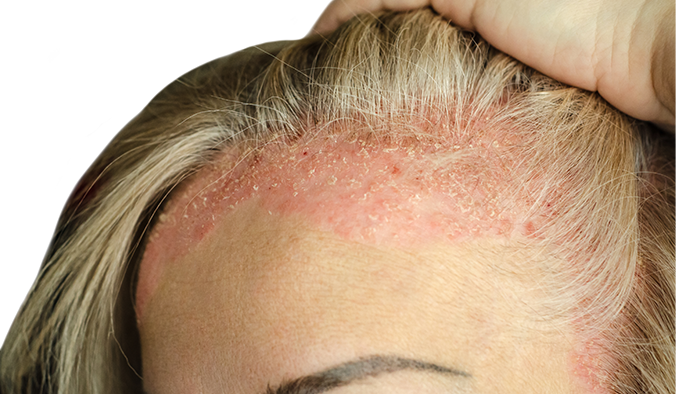
Acne (Acne vulgaris)
Acne is the most common skin disorder treated by dermatologists. It is also a chronic inflammatory disease of the skin that affects 85% of us at some point.
As with all skin conditions, the psychological impact of living with acne is significant. Many people become detached from friends and take time off school or work because they feel self-conscious and fed up. We can help to balance hormones, reduce inflammation, and correct nutritional deficiencies to help improve the severity of this condition.
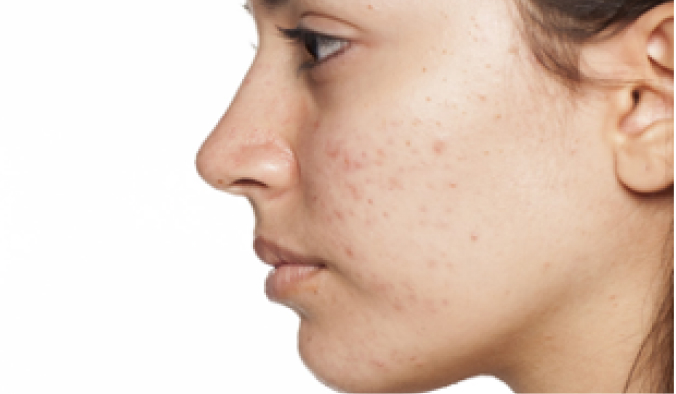
Eczema (Atopic dermatitis)
Eczema is also a chronic inflammatory skin disease that affects 20% children 10% of adults. Eczema typically causes dry scaly patches that cause itching and scratching anywhere on the body.
Sleep can be disrupted because of itching and this results in daytime drowsiness and a loss of focus. It can feel difficult to get through the day sometimes. It isn’t surprising that both children and adults who have eczema are absent from school and work more often than without the disease. As well as issues associated with itching and lack of sleep, sufferers are nearly twice as likely to suffer from stress, depression, and anxiety. Like other skin conditions, eczema can lead to social avoidance. Most importantly, childhood growth and development can be impacted.
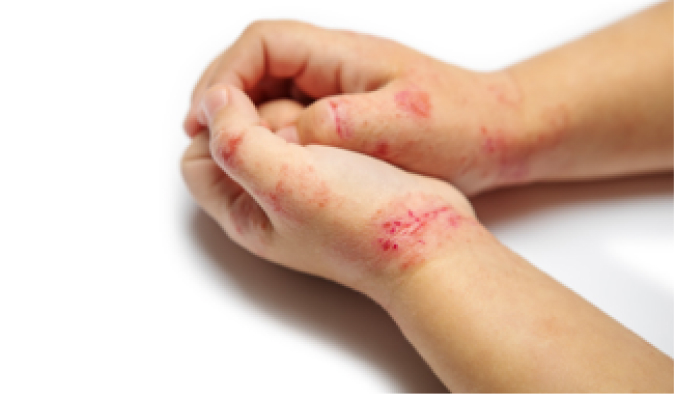
Rosacea
Rosacea often first appears as flushing or redness on the cheeks, nose, and chin, or forehead. Over time the redness can become more regular and blood vessels may become visible. It is thought that people with fair skin, who blush easily, maybe at the greatest risk of rosacea.
As with the other skin disorders mentioned, rosacea is an inflammatory disorder. Nutritional interventions can reduce inflammation and help to promote healthy skin.
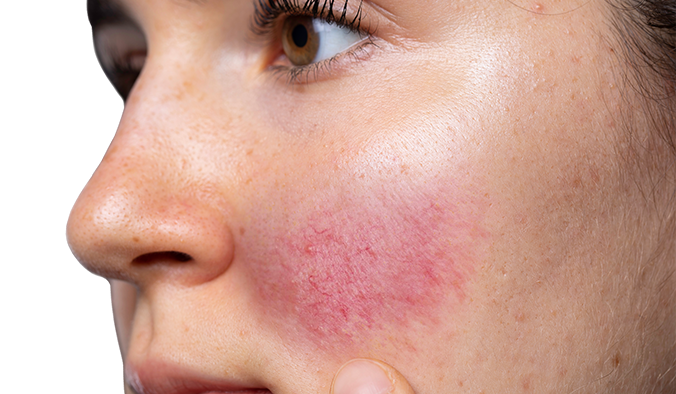
We really want to help you reduce the severity of your symptoms and improve your quality of life.
We know that living with a skin condition can impact your mood, social life and sleep. It can feel These conditions are sometimes viewed as medically trivial complaints. Clinicians may find it difficult and time consuming to discuss how a dermatologic condition is impacting a patient socially and emotionally, but this approach is key to any holistic treatment. Also, few GPs and pharmacists have specialist training in treating skin conditions and so treatment selection can be hit and miss. Unsurprisingly then, many people look to self-treatments and over the counter medicines, but again with mixed results. Without specialist dermatology advice it can be difficult to select the best treatment for a condition and drum up the motivation to keep on going with it. No wonder many people end up feeling disappointed and disheartened.
Nutrition and Skin Aging
Whilst skin aging is a natural process, nutritional and lifestyle approaches can help to combat some of the factors that influence the rate we age. By correcting inflammatory imbalances and nutritional deficiencies, as well as combating against environmental stressors and hormone imbalances, we can help you to protect your skin from the daily rigours of life and bring a little glow to your checks.

Treating Your Skin Conditions
Specialist skin consultations are available with Juliet. She works with you to select the best approach for your needs. Your bespoke Dermatology Nutrition Plan will align with your personal requirements, preferences, and lifestyle.
When required, Juliet combines her nutrition and lifestyle expert knowledge with support from a Dermatology Consultant to offer a combined specialist service. This optimal medical support will help ensure you feel even more amazing!
Look out for our 14-day menu plan for skin health and our short Nutrition for Skin Health course, which are coming soon.
“Love The Body You Live In”
Catch Up With Recent Blogs
Treatment for Skin Conditions: Psoriasis, Eczema, Rosacea, Acne
60%Of people in the UK will suffer from a skin condition at some point. in their life25%Of people visit their GP for support with a skin condition each year.64%Of people that suffer from a skin condition use over-the-counter treatments to try to relieve symptoms but...
Nutritional Medicine and Why It Matters to You
Nutritional medicine is a rapidly developing science that has become increasingly complex over the last 20 years as we learn more about the relationship between nutrients and the human body. I am proud to have witnessed the many secrets of nutritional medicine during...
How to eat sustainably
Sustainability has become a buzzword in 2022 and now everything we read is packed with ideas and innovations on how companies and their products plan to become more sustainable. Features on ‘Sustainability’ are literally everywhere, and we celebrate that. With so much...
Download our Skin Health Guide
Download our Skin Health Guide


